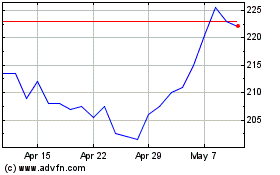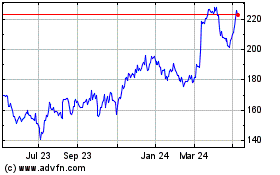Tullett, ICAP Brokerage Deal Hits Antitrust Hurdle
June 07 2016 - 8:40AM
Dow Jones News
LONDON—Tullett Prebon PLC's £ 1.1 billion ($1.6 billion) deal to
buy a voice-brokerage business from British rival ICAP PLC faces an
inquiry from the U.K.'s competition watchdog.
The Competition and Markets Authority has referred the deal,
which would significantly reshape the interdealer brokerage
landscape in the U.K., for an "in-depth investigation" to determine
if it reduces competition in the sector.
The investigation could take up to six months, a spokesperson
for the regulator said on Tuesday.
The deal between longstanding rivals Tullett and ICAP, founded
by high-profile City of London figure Michael Spencer, was
announced in November last year.
The combination would create the world's largest interdealer
brokerage house with revenue of £ 1.5 billion a year. Interdealer
brokers—which match buyers and sellers of securities on behalf of
investment banks—have struggled since the financial crisis. Tougher
financial regulations have crimped the trading activity of banks on
which the brokers were heavily dependent.
Despite fierce competition in the sector, Mr. Spencer said in
November that the two companies had become "a happily married
couple". Upon completion of the deal ICAP plans to begin trading as
NEX Group with a focus on electronic trading and after-trading
activities.
The CMA said its investigation will only focus on oil products
where the merger might gives rise to "a realistic prospect of a
substantial lessening of competition" as rivalry from other brokers
is more limited.
Andrea Coscelli, CMA executive director of markets and mergers,
said: "In this area, the parties have a strong market position,
there is more limited competition from brokers and other electronic
platforms, and the CMA has heard a number of third party
concerns."
The CMA said there are 20 product categories in which the two
companies' services overlap.
Arnaud Giblat, an analyst at Exane BNP Paribas, said that he
doesn't see the CMA action as a "stumbling block" for the deal to
close. A carve-out of the oil-brokerage business could be one
possible solution, Mr. Giblat said.
Commodities represent roughly 20% of ICAP's voice-brokerage
revenues, with the oil business representing a smaller percentage
within that, he said.
Patrick Young, an exchange consultant and director at DV
advisers, described competition concerns over oil and voice
brokerage as "hardly material".
"There is no material impact and the investigation escalation is
difficult to justify when applying even a local lens of
perspective," Young said. "Given that the vast bulk of revenue at
ICAP comes from the brokering of money, there may even be a form of
relief at ICAP and Tullett that only oil voice-brokering is being
targeted here."
He added that the merger changed "the entire market-structure
parish and is a potential 'win-win' for both parties".
Tullett Prebon said it "intends to explore how best to satisfy
the CMA's concerns." ICAP said it is "confident" the CMA will clear
the deal.
Both companies said they still expect the transaction to close
later this year.
(END) Dow Jones Newswires
June 07, 2016 09:25 ET (13:25 GMT)
Copyright (c) 2016 Dow Jones & Company, Inc.
Tp Icap (LSE:TCAP)
Historical Stock Chart
From Apr 2024 to May 2024

Tp Icap (LSE:TCAP)
Historical Stock Chart
From May 2023 to May 2024
